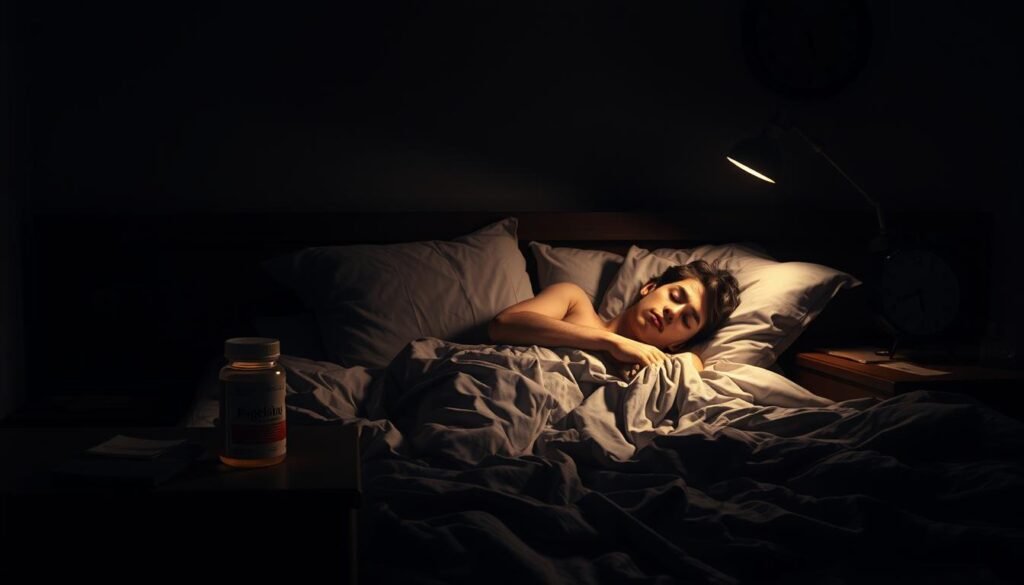Did you know that people with anemia are 32% more likely to have insomnia? A study of over 12,000 adults shows a link between anemia and poor sleep. This is key because up to 30% of folks have trouble sleeping. It’s vital to see how iron deficiency anemia might make sleep issues worse.
Anemia lowers hemoglobin, which affects oxygen transport. This might disturb sleep. Studies say anemia might add to sleep health problems, without being the sole cause. Better iron levels and tackling anemia could help those with sleep troubles. For detailed insights on anemia and sleep, check out more here.
Key Takeaways
- The link between anemia and sleep trouble is proven by studies.
- A study indicates those with anemia might struggle with insomnia more.
- Knowing about iron and its role can illuminate its effects on sleep.
- Addressing anemia may improve sleep patterns for some.
- Different anemia types need specific treatments.
Understanding Anemia
Anemia is a major health issue. It means having fewer red blood cells than normal. This leads to less oxygen reaching your body’s tissues. It’s important to understand the different types and causes of anemia.
Definition of Anemia
Anemia means not having enough healthy red blood cells. This causes tiredness and affects your health. Learn about iron deficiency anemia to see how diet plays a role in health.
Common Types of Anemia
There are several types of anemia, each unique:
- Iron Deficiency Anemia: Happens when you have low iron, impacting cell production.
- Vitamin Deficiency Anemia: Comes from not having enough vitamins like B12 and folate.
- Aplastic Anemia: A rare case where the bone marrow doesn’t make enough cells.
- Hemolytic Anemia: Caused by red blood cells breaking down too soon.
- Sickle Cell Anemia: A genetic issue that leads to oddly shaped cells.
Causes of Anemia
The causes of anemia vary widely, including:
- Blood loss (like from menstruation or stomach bleeding)
- Not eating well, leading to missing key nutrients
- Long-term illnesses like kidney disease or cancer
- Genetic conditions that affect cell production
- Being older, which raises the risk of anemia
The Importance of Iron in the Body
Iron is key for our health because it helps make blood and gives us energy. Knowing this helps us fight iron deficiency and its effects on sleep.
Role of Iron in Blood Formation
Iron is essential for making hemoglobin in our blood cells. Hemoglobin carries oxygen everywhere in our body. Without enough iron, we can’t transport oxygen well, leading to anemia.
Anemia makes people feel tired and weak, messing with daily life and sleep. About 1 in 5 women of child-bearing age are anemic due to low iron. This highlights the need to keep an eye on iron levels. For people with illnesses like Crohn’s disease, the risk of low iron is even higher. This can harm their blood health.
Iron as a Nutrient for Energy Levels
Iron boosts energy by helping our bodies use oxygen. If iron is low, we may feel constantly tired. This makes staying awake hard, harming sleep quality at night.
Feeling more tired can lead to insomnia, making sleep issues worse. Fixing iron deficiency with food changes and supplements can improve energy and sleep.
How Anemia Affects Overall Health
Anemia can deeply impact a person’s health. It includes many symptoms and possible problems. Knowing about these symptoms is key for catching it early and treating it right.
Symptoms of Anemia
People with anemia often feel slowed down in their everyday life. They might experience things like:
- Fatigue – Feeling tired all the time, even after resting.
- Pallor – Skin and mucous membranes look pale.
- Dizziness – Feeling woozy or faint, mainly when getting up.
- Shortness of breath – Hard to breathe during normal activities.
Noticing these signs is crucial to tackle the issue before it gets worse.
Complications Related to Untreated Anemia
If not dealt with, anemia can cause serious problems. Some risks include:
- Heart issues – The heart may need to pump harder, leading to heart failure.
- Cognitive impairments – Lack of oxygen can hurt your ability to think and remember.
- Pregnancy complications – Risks like having the baby too early or with too little weight.
Knowing the signs of anemia and the problems it can cause if ignored is crucial. Catching it early means it can be managed better, helping to improve health.
Does Anemia Cause Insomnia?
Anemia and sleep problems are closely linked. Studies have focused on the question: Can anemia lead to insomnia? People with anemia often face many symptoms. These symptoms can hurt how well they sleep.
Association Between Anemia and Sleep Issues
Research shows a strong link between anemia and problems sleeping. Iron deficiency is the most common type of anemia. There are also types like vitamin B12 and folate anemia. Anemia reduces oxygen in the body. This can make you wake up often at night.
Symptoms such as a faster heartbeat can cause stress and anxiety. This makes sleeping harder. Restless legs syndrome (RLS) is also connected to anemia. It causes discomfort at night, making insomnia worse.
Research Findings on Anemia and Insomnia
Recent studies have given us important numbers. One study found that 21.2% of textile workers had iron deficiency anemia. Surprisingly, 78.2% had sleep disorders. This shows a clear link between low hemoglobin levels and bad sleep quality.
Cognitive behavioral therapy for insomnia (CBT-I) looks hopeful for those with anemia-related sleep problems. Looking into treatment options and improving lifestyle habits can help. It can offer relief to those dealing with sleep issues because of anemia.

The Impact of Iron Deficiency on Sleep Quality
Iron deficiency is key in both sleep quality and anemia. It affects how well people rest and recover. Low iron levels are tied to many sleep disorders. Studies highlight a link between not enough iron and problems like insomnia and restless legs syndrome (RLS). These issues can greatly disturb sleep at night.
Links Between Iron Levels and Sleep Disorders
Research shows that those with lower hemoglobin often sleep less. A study with infants found anemia linked to being short sleepers. As hemoglobin went up, sleep time increased by 16.2 minutes for each unit. This shows how vital healthy iron levels are for good sleep and fighting sleep troubles.
Chronic Fatigue and Sleep Disturbances
Iron deficiency and anemia can cause chronic fatigue and insomnia. This fatigue reduces daily activity, affecting sleep. Both children and adults may see their energy dip. This leads to messed-up sleep schedules, making insomnia worse. So, tackling iron deficiency is key for better sleep and health.
Anemia Symptoms That Affect Sleep
Anemia shows up in many ways, hitting sleep quality hard. One key issue is Restless Legs Syndrome. This problem really makes sleeping tough, showing how anemia messes with sleep. Other symptoms also make sleeping well hard, so it’s important to get the whole picture.
Restless Legs Syndrome and Insomnia
Restless Legs Syndrome (RLS) often goes hand-in-hand with anemia causing insomnia. If you’re low on iron, you might feel like you have to move your legs a lot at night. This ruins sleep, leading to feeling tired and restless all the time. Studies have found that not having enough iron is linked to several sleep problems, including RLS. This makes things harder for those dealing with it.
Other Anemia-Related Sleep Disruptions
Anemia causes other sleep issues too. You might feel really tired, have heart palpitations, or even struggle to breathe right. These can keep you up at night. Sometimes, anemia makes you crave weird stuff, which doesn’t help you sleep well either. Eating foods rich in iron, like dark leafy greens and legumes, might help with these symptoms. To learn more about anemia and insomnia, check out more details here.

Treating Anemia-Related Insomnia
Anemia leads to fewer healthy red blood cells, causing symptoms like insomnia. Treating insomnia linked to anemia is key. Strategies include iron supplements and changing your diet to increase iron levels. Knowing these methods’ benefits and risks helps improve sleep.
Iron Supplements: Benefits and Risks
Iron deficiency anemia causes fatigue and insomnia. Iron supplements can help by raising iron levels, boosting energy, and reducing sleep issues.
However, it’s important to know the risks of iron supplements. Too much can cause stomach issues and toxicity. Always talk to a healthcare provider before starting supplements.
Dietary Changes to Improve Iron Levels
Eating foods high in iron can also boost iron levels. Adding iron-rich foods to your diet can increase your body’s iron. Foods to add include:
- Dark leafy greens, like spinach and kale
- Nuts and seeds, such as pumpkin and sesame seeds
- Legumes, like lentils and chickpeas
- Grass-fed meats for heme iron
To help your body absorb iron, eat more vitamin C and less caffeine with meals. These changes can enhance sleep and overall health.
To learn more about dealing with anemia’s symptoms, check out info on treating anemia-related insomnia.
The Role of Sleep Hygiene
People with anemia need to keep good sleep habits for their health. Getting better sleep is crucial for dealing with anemia’s symptoms, like difficulty sleeping. By following helpful daily routines, one’s sleep can improve, making it easier to fight off insomnia.
Improving Sleep Quality for Anemia Patients
Anemia patients should set up a relaxing bedtime routine. This might include reading or light stretches to get the body ready for sleep. It’s important to sleep for seven to nine hours every night on a regular schedule. This helps balance the body’s clock.
Daily Habits to Combat Insomnia
- Limit screen time at least an hour before bed to reduce exposure to blue light, which can interfere with melatonin production.
- Create a calming sleep environment with comfortable bedding and appropriate room temperature.
- Minimize caffeine intake, especially in the afternoon and evening, as it can hinder sleep quality.
- Practice relaxation techniques, such as deep breathing or meditation, to ease anxiety and promote restful sleep.
Following these tips can lead to better sleep and less insomnia for those with anemia. Building good sleep habits is key to improving health.

Consulting Healthcare Providers
Knowing when to seek help for anemia is very important for your health and sleep. If you feel tired, weak, or find it hard to breathe, it’s time to get help. Seeing a doctor for anemia means your symptoms will be checked correctly. Acting early can mean you get better treatment and feel well again.
When to Seek Help for Anemia
Anemia comes from many different causes. It’s key to figure out why you have it. You should see a doctor if you have signs like:
- Persistent fatigue despite adequate rest
- Unexplained shortness of breath
- Frequent heart palpitations
- Blood loss indications, such as bleeding gums or nosebleeds
- Increased difficulty concentrating
Importance of Professional Diagnosis
Getting a professional diagnosis is vital. Anemia comes in many forms, each needing specific care. For example, lack of iron causes one type, while another is due to not absorbing vitamin B12 right. A doctor can decide on the best tests and treatments. Without a correct diagnosis, you might miss important care. A detailed check-up helps find the right solution, improving not just anemia but also sleep quality.
| Symptom | When to Consult |
|---|---|
| Persistent fatigue | Immediately |
| Shortness of breath | As soon as experienced |
| Heart palpitations | Urgently |
| Blood loss indications | Promptly |
| Difficulty concentrating | In a timely manner |
Research on Anemia and Sleep Disorders
Recent studies have shown a close link between anemia and sleep problems like insomnia. A study with 104 anemia patients and 80 healthy people found interesting results about sleep. Using the Pittsburgh Sleep Quality Index, 67.3% of anemia patients reported poor sleep. In contrast, only 40.5% of healthy individuals did.
People with anemia also showed higher anxiety and depression levels. These issues can make sleep problems worse. In fact, 43.3% of the anemia group had anxiety scores above the usual level.
Recent Studies on Insomnia and Anemia
Scientists keep discovering more about the link between anemia and sleep. For example, anemia patients had a sleep quality score of 6.71, higher than the 4.11 score of healthy people. This significant difference points out that anemia increases the risk of insomnia. Recent findings also point out that sleep issues are more common in certain groups, suggesting the need for more detailed studies in the future.
Future Directions in Anemia Research
Future studies might look into genetic factors, like the MEIS1 gene’s role in anemia and sleep problems. Understanding these genetic connections could lead to better treatments for people with both conditions. As research continues, we hope to find new ways to improve the lives of those affected by anemia and sleep disorders.